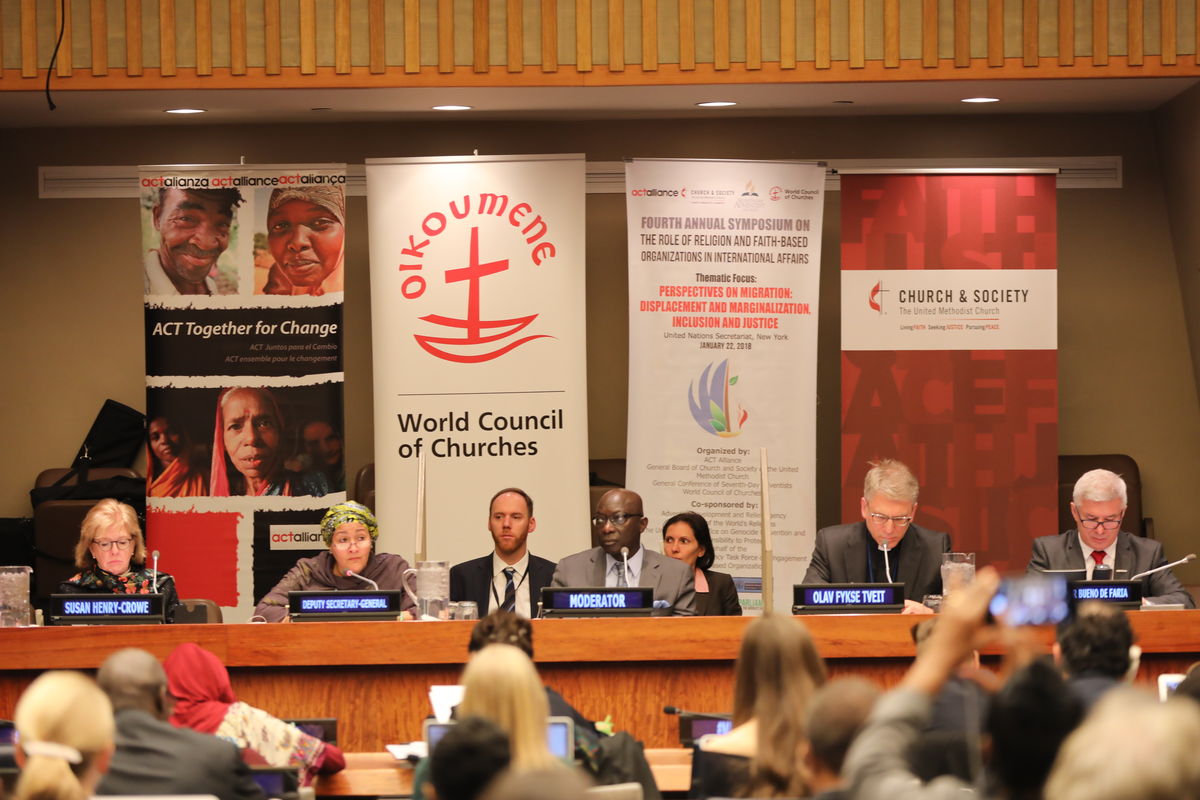Symposium highlights
Church and Society recently co-hosted the Fourth Annual Symposium on the Role of Religion and Faith-based Organizations in International Affairs at the United Nations Headquarters in New York City.
As a newcomer to U.N. work, I was anxious to observe, especially since the event has become a critical space for faith-based organizations and nongovernmental organizations to engage with U.N. officials. This year’s theme, Perspectives on Migration: Displacement and Marginalization, Inclusion and Justice, brought together a diverse panel of experts with a full range of personalities and professional experiences of heartbreak and success.
The symposium is worth watching in its entirety on U.N. Web TV. As you watch, you’ll see the narrative about migrants, refugees, and displaced people is as contested and choppy as the terrains they walk.
Here are a few of my favorite parts:
Migrant voices
The session on Rule of Law and Political Perspectives, moderated by the Rev. Levi Bautista of Church and Society, featured Eni Lestari, an Indonesian domestic worker and chairperson of the International Migrants Alliance, who spoke truth to power on behalf of migrants.
People who care ask, what can we do? What can I do? These are the right questions, but you’re not asking the right people, she said. “We can speak for ourselves.”
Lestari called on each of us to denounce the domestic and foreign policies propping up the cheap labor markets that allow transnational corporations to create the conditions that led us to today’s crisis.

“Keep committing to charitable acts,” she said. “We need them. But also treat migrants and refugees as partners on a journey.” The panelists unanimously agreed that on all levels of policy talks and coverage of the issue, we must take care to talk of migrants, not migration.
Ms. Lestari’s comments reiterate what we should already know, especially in light of President Trump’s recent comment about “shithole countries.” We’ve been giving the microphone to the wrong people and allowing the loudest voices in the room to dominate the conversation, instead of the real stakeholders.
However, an unexpected high point came next, as Lestari named some concrete ways faith-based organizations are helping: offering sanctuary; providing educational, medical, and social services; and, as was the case here, including and highlighting migrant and refugee voices in the conversations about them, especially those that inform official policies.
Organ trafficking
Later, after paying tribute to two colleagues recently executed in the field, human trafficking expert Dr. PL de Silva explained how domestic and foreign policies often support criminal and corporate enterprises instead of protecting migrants. He also described one of the horrific subsets contributing to this $5-6 billion per year industry.
“I want to shine light on the organ trafficking that’s going on,” he said. “There is a special route across the central Mediterranean from Libya where the Sicilian mafia get hold of the migrants, and there’s a very large transplant center in Sicily that’s expanding. These allegations are very difficult, contentious, and dangerous to investigate. But we are persevering.”
No one should die this way
Jason Cone, executive director of Doctors Without Borders/Medecins Sans Frontieres in the U.S., condemned the U.S.’s continued deference to “inhumane” policies and complicity in giving political cover to hate.
He began his presentation with a short video of MSF workers medically evacuating panicked refugees from a sinking boat in the Mediterranean that was slowly filling with fluid. It becomes apparent the fluid isn’t just seawater, but chemicals from leaking fuel lines, and that these men, women and children are burning alive. While MSF was able to save 107 people, they discovered more than 20 dead bodies at the bottom of the boat.
The video ends with a simple voice-over: no one should die this way.
One has to ask: what safeguards my fate from being the same as those in the bottom of the boat? Nothing, except the random, unearned privilege of not being born in the wrong place at the wrong time. It’s painful, but certainly necessary, to glimpse how acutely we’ve failed to be our brothers’ and sisters’ keepers.
Who are we?
Again and again, panelists voiced our collective crisis of identity, not only as organizations rooted in faith, but as human beings: Who are we? Will we act? Do we have the conviction and political courage needed to be a moral compass?
Dr. Ganoune Diop, secretary-general of the International Religious Liberty Association, provided one answer, “My hope is that the best of faith can overcome the worst of religion. There is almost unanimity in the religious texts regarding treatment of others. Religious people need to live by the depth of their faith, where there is consciousness of being part of the one human family.”